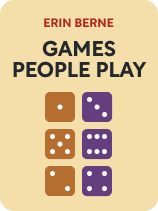

This article is an excerpt from the Shortform book guide to "Games People Play" by Eric Berne. Shortform has the world's best summaries and analyses of books you should be reading.
Like this article? Sign up for a free trial here .
What is Eric Berne’s transactional analysis theory? What was Berne’s goal in developing his theory?
In his book Games People Play, Eric Berne explains his approach to understanding social interaction: Transactional Analysis. Berne’s goal wasn’t just to analyze human interactions, but to discover destructive patterns so people can realize what games they’re playing (intentional or not) and improve their relationships with others.
Let’s take a look at the key tenets of Berne’s theory.
Introduction to Transactional Analysis
Games People Play is about the many ways that we habitually relate to one another. It describes Eric Berne’s Transactional Analysis (T.A.), his approach to understanding social interaction, and it shows how T.A. makes sense of everything from our ritual greetings to our unconscious social games.
In pioneering T.A., Berne broke from the established psychoanalytic methods of the time to pursue a theory of social psychology. He held an MD from McGill University, interned at Yale University School of Medicine, and spent over 15 years in psychiatric training.
Berne’s theory is a lens through which to look at our social habits. Among other things, it reveals the nature of the unhealthy patterns we enact in our relationships and lives. With the “games” framing, we can learn to identify and move beyond these destructive habits. We can take meaningful steps toward lives of greater intimacy and maturity.
Games People Play was Berne’s breakaway 1964 bestseller, popular despite having been written mainly for other clinicians. It spent over two years on the New York Times bestseller list, and he followed it up with What Do You Say After You Say Hello and Sex in Human Loving before his death in 1970.
Transactional Analysis is fairly technical, so we’ve distilled it to the essentials. This guide provides mental models that will equip you to better understand and navigate how you relate to others. We also contextualize Berne’s ideas with contemporary updates to the science and introduce new examples where his have fallen out of date.
A Brief Overview of Transactional Analysis
Think back to a romantic partner you’ve had, back to the patterns you fell into with each other. The relationship probably featured both healthy and unhealthy habits—you probably laughed, loved, and learned; you may have hurt, deceived, or let one another down.
These relationships, and the habits that compose them, are where games take place. But before we get to that, let’s sketch an overview of T.A. Berne’s approach was to study social interaction, and he often treated one or both partners in close relationships (though his theory goes beyond intimate relationships, too.)
Your social habits, Berne noticed, offer hints about less-obvious parts of you. Delving into them, analyzing what’s going on beneath the surface, was how Berne sought to identify and heal harmful underlying beliefs and the behaviors they fueled.
(Shortform note: Berne’s theory depends on the idea that unconscious thoughts and feelings influence our behavior. This is a direct borrowing from Sigmund Freud, whose influence is evident in the core ideas of T.A.—for example, Berne’s theory of personality has three parts (child, adult, parent) that seem to parallel Freud’s own three-part model (Id, Ego, Superego.) We’ll point out these connections throughout the guide.)

———End of Preview———
Like what you just read? Read the rest of the world's best book summary and analysis of Eric Berne's "Games People Play" at Shortform .
Here's what you'll find in our full Games People Play summary :
- The many ways that we relate to one another through “games”
- Why you might be missing out on the fulfillment of game-free living
- How to identify and overcome unhealthy games






